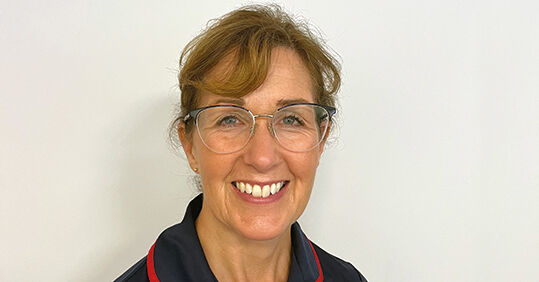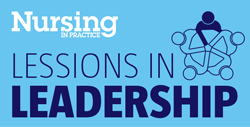Lessons in leadership: Looking after asylum-seeking families

Derby is a Home Office dispersal location, where asylum seekers are housed when they reach the UK, and Virginia Hickman is part of a dedicated team funded by Derby City Council and the NHS to support children and families arriving in the city

I was a practice nurse for around eight years before I became a health visitor, so I’ve always worked in the community. Public health commissioned us to safeguard and support children of asylum-seeking families, who often go under the radar as they do not access healthcare. Although babies and children may come under universal services, we found their needs weren’t really being met.
We’re a team of four working in partnership with the local authority: two public health nurses, a family health practitioner and a child practitioner from the council who looks at the social side, supporting early years.
As public health nurses we both have school nurse and health visitor qualifications, so we can address the full 0-19 age range. We follow the healthy child programme, with all the normal contacts, but our work is needs-led. If there’s a family that requires more contact, we support their health needs for as long is required.
I am also a non-medical prescriber so I can prescribe within my scope of practice, easing access to healthcare for patients and avoiding the need for a GP appointment.
Related Article: NHS CHC funding: How can nurses better advocate for patients?
Complex health needs
These are vulnerable families, new to the county, and not always able to access financial or social care support. With that comes the risks of health inequalities, and the children may have complex health needs as well.
Our service helps overcome language and cultural barriers and a mistrust of services. They may be from somewhere with little or no provision, or where healthcare is not free. We help them navigate aspects of the system like registering with a GP and accessing care out of hours. Some children may need specialist care, like orthotics or audiology, and we offer guidance on referrals.
They might not have had a positive experience of healthcare services in their country, and we also need to consider the UK’s wider reputation for things like social services as they can be suspicious of different agencies. We try to develop a good relationship so they’re aware of how we can help, but this does take time.
Our aim is to see a family within seven days of their arrival, undertake health assessments with the children and give the families the information they will need should they become ill. If a child has any existing health needs we address those as soon as possible, and we check if they are up to date with their vaccinations and liaise with local GPs on that.
We generally have the flexibility to meet our seven-day target, unless people are coming in larger numbers, for example from a country affected by war, like Ukraine or Afghanistan. Even if they do arrive all at the same time, then at least they tend to be in one place.
On my caseload I can have up to 40 patients, which is quite manageable. At the moment we’ve got 36 parents, including two expectant mums, and 30 children in one initial accommodation hotel, and I think we’ve had about 25 Ukrainian families over the past year. The average caseload is between 30 and 40.
When we were first set up, we identified families who were registered with a GP, or who we knew were coming to one of the bridging hotels. As Derby is a dispersal city – where asylum seekers are housed until their applications can be processed – it can be harder to reach people in the community due to data protection and lack of information sharing from local authorities. We try our best – we know there are 200 addresses in the city so if we can’t get hold of them by phone, we knock on doors.
Related Article: It’s time to be arguing the economic value of nursing
You want to do the right thing for the families and the children but it can be quite difficult, particularly when you turn up unexpectedly and you don’t know where they’ve come from. But we’ve now got a good relationship with Serco – the Home Office housing contractor in our area – and they tell us when families move in.
We use the Language Line interpretation service, or a face-to-face interpreter if we have enough notice. Google Translate can help, particularly if there’s been an influx of numbers with high demand on translators who speak a particular language.
A service designed by the team
Over the past year we’ve looked at what we need to offer and the service has been very much designed by us as a team. It’s up to us to find the families and be creative. We’ve had the freedom to develop our own systems, so we deliver what we set out to do for families – reduce health inequalities, ensure they’re accessing healthcare in the right way to meet their needs, and keep them safe.
As a specialist nurse at Band 7 there’s an expectation that it’s our service to push forward and develop. But we still need safeguarding and specialist knowledge; it’s a very rewarding job, but the families can be quite traumatised and have differing needs. You have to understand that each family is unique in order to meet their particular needs or signpost them to other services.
It would be great to have more nurse-led services like ours across the country. We liaise with GPs and others associated with the families, such as councils, charities and the Home Office, and we have regular professional liaison meetings. We’ve had huge success by sharing information and good practice through working as a team.
Related Article: Nurses ‘left out of critical decisions’ despite more chief nursing officer posts
In July 2023, our team won a regional NHS Parliamentary award for health equality for the service we provide to our families. It was a proud moment when we went to Westminster for the national awards to celebrate what we had achieved and represent our trust.
Virginia Hickman is a specialist community public health nurse for asylum-seeking families at Derbyshire Healthcare NHS Foundation Trust
Interview by Katherine Price.

See how our symptom tool can help you make better sense of patient presentations
Click here to search a symptom




